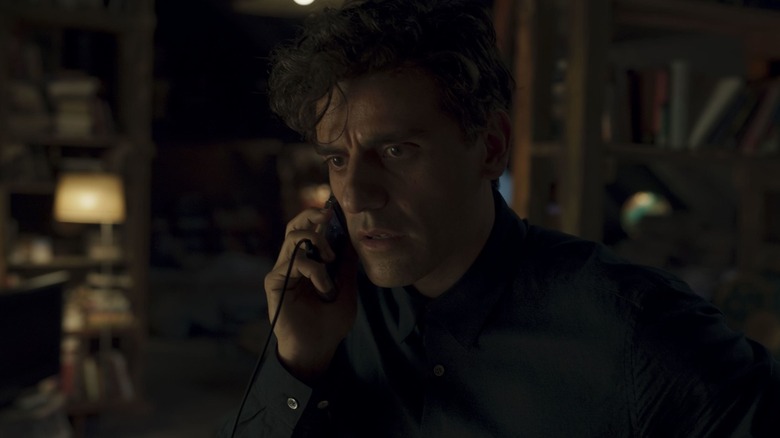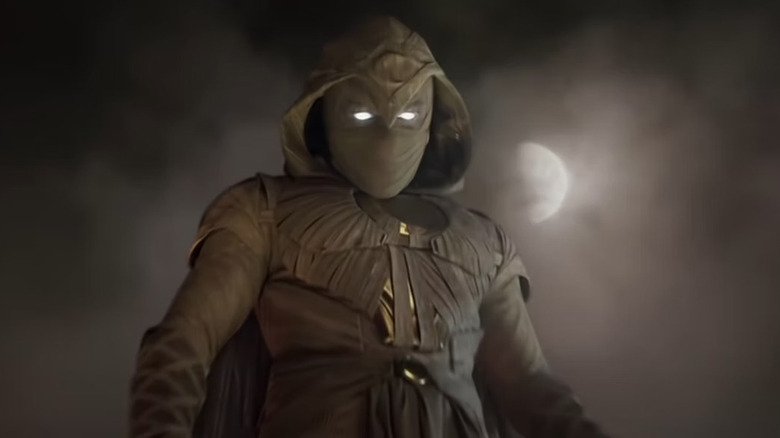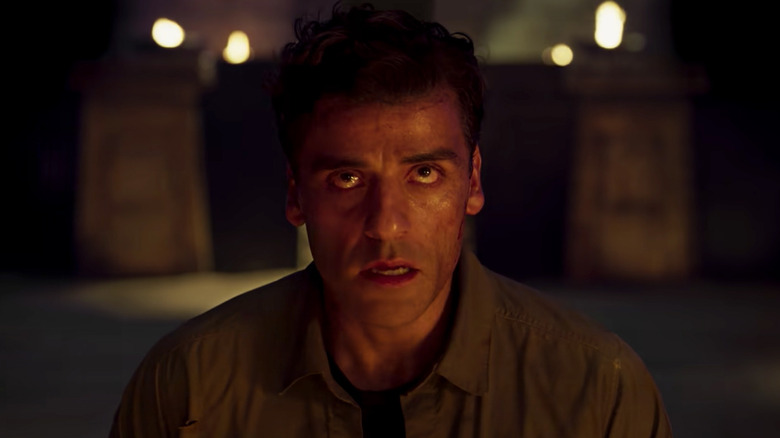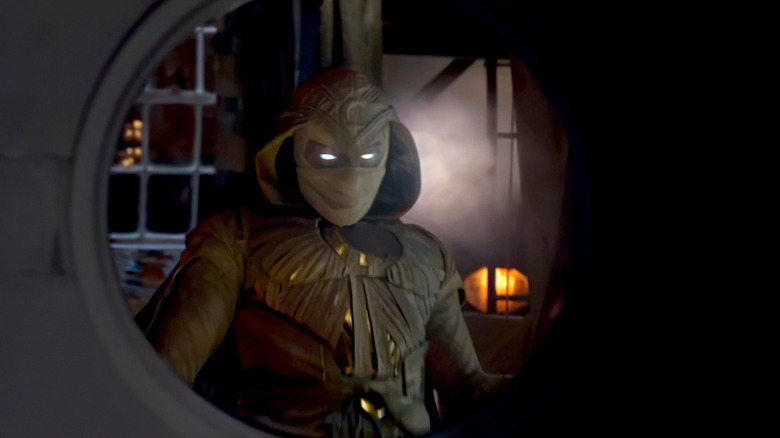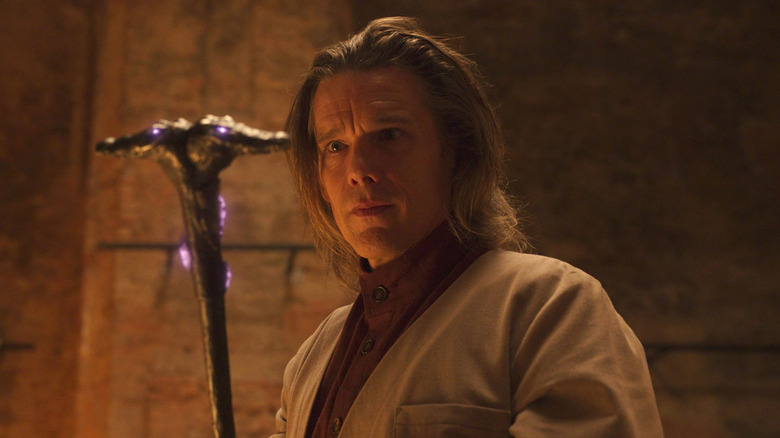Moon Knight Directors Justin Benson And Aaron Moorhead Talk Cinematic Influences And Creative Cohesion [Interview]
"Moon Knight" has officially premiered on Disney+, with the first of six episodes available on the streaming service now. Since this is unlike the rest of Marvel's TV offerings, the series requires a bit of patience. Unwitting museum gift shop employee Steven Grant (Oscar Isaac) finds himself caught up in an international caper thanks to a startling secret that he's keeping from himself, thanks to his dissociative identity disorder and an alternate personality. So we're on a roller coaster ride of mystical intrigue alongside him every step of the way, leaving plenty of questions that are answered as the show goes on.
Leading up to the release of "Moon Knight," /Film spoke with directors Justin Benson & Aaron Moorhead ("The Endless") to talk about their jump from independent film to the Marvel Cinematic Universe. Benson & Moorhead talk about their cinematic influences, finding a creative collaboration with fellow "Moon Knight" director Mohamed Diab ("Clash"), and much more. Read the full interview below.
'As independent filmmakers, there's this temptation that if Marvel comes knocking...'
I can only assume that the Sh*tty Carl Universe really made you prime candidates to tackle something as complex as the Marvel Cinematic Universe.
Benson: Yeah, it's kind of shocking how we have five films that are all within a tiny little micro budget: The Sh*tty Carl Universe, as you said. And multiverse, I guess you could also say. When we found out that Marvel is also expanding into the multiverse and all of that, we decided to take them to court.
[Everyone laughs]
Speaking of which, I heard that you two might have met with Marvel Studios about a different project dealing with a certain multiverse of madness. Can you talk about that at all and how that might have played out?
Benson: Well, it's funny, we've been going into Marvel, pitching on a lot of stuff, and trying to work on something with Marvel forever. As independent filmmakers, there's this temptation that if Marvel comes knocking, you might just want to take what it is, do your absolute best, and try to get it. We just couldn't believe that "Moon Knight" actually was so much within our wheelhouse. It's so similar to the kind of thing that we do, and that was a blessing, because you want so badly to be part of the great American myth that is Marvel. And that it's actually a myth that you're able to tell very well, or feel like you can, is a blessing.
What's it like meeting with Marvel Studios for the first time? Are you coming in with pitches ready for them? Do they talk to you about the projects that they want to develop and gage your interest?
Benson: Oh man, honestly, there's not one answer. So there's so many ways these things happen and that they come to be.
Moorhead: Also, full disclosure, the last decade is kind of a blur of extraordinarily long complicated pitches. And then oftentimes not getting the job that we pitched for.
'If you say you read Moon Knight, that's sort of like being into punk rock music'
Were you guys Moon Knight fans before this opportunity came along?
Benson: I had only heard the name of "Moon Knight," but didn't really know much what it was. Obviously, I'm now an enormous fan after the coolest thing in the world happened to me, which is we found out we were going to be given the opportunity to pitch for this. So they dumped every "Moon Knight" comic [on me]. I asked for it, I said, "Which Moon Knight comic should I read?" And they said, "All of them. Every single 'Moon Knight' comic ever."
Wow.
Benson: It's a very cool email to have received. I'm sorry, [to clarify] it's digital form. I don't think I have enough room in my room for it, if it was actually all the comics. But yeah, I have every single "Moon Knight" comic ever made, which is pretty cool.
That's awesome.
Moorhead: When I was little, about eight years old, was my first exposure to "Moon Knight." It was in the context of like ... a good analogy for liking Moon Knight was, the comic books were given to me with the statement that essentially, in the realm of comic books, if you say you read "Moon Knight," that's sort of like being into punk rock music, and being like, "I don't listen to Green Day. I listen to Bad Brains and Dead Kennedys." So it was like the cool deep cut. This is what I remembered of Moon Knight. I naturally gravitate towards independent films, which we've been doing for over the last decade, so that was always the Marvel character that seemed like a good fit.
You guys are a filmmaking duo. So surely more often than not, you are on the same creative wavelength. Was there anything during the process of making "Moon Knight" that you guys found yourself disagreeing on, having debates about?
Benson: No, with "Moon Knight" — I don't know what to call it, serendipitous in a way — we ended up not having to butt heads, even with the people that were hired before we had come on board. It genuinely feels like Marvel has this superpower of finding just the right people to combine together. At least that was the case for us with "Moon Knight," where everybody that we worked with ended up being people that we just kept on agreeing and building on each other more and challenging each other to make more and more interesting stuff.
When we needed to build a scene out and figure out exactly what we're going to do with it, somebody throws out the first idea. We always know that's the bad one because it's the obvious one. And that takes us down the path to the second idea. We normally land at like the fourth or fifth idea. We're just so used to that at this point, that's kind of just our process. Most of it, the harder heavy lifting was that while we were working on "Moon Knight," we were also editing "Something in the Dirt," our new independent film. We just had a lot to figure out with all of that. Still there are even more moving pieces at that point.
'Some of it is quite abstract imagery'
You mentioned figuring out how to build a scene out, and there are some really creative ways that you guys depict the reflections of Mark Spector and Steven Grant interacting throughout the two episodes that you guys direct. Are you able to do a lot of that practically or does it require visual effects, other than creating the composite shots?
Benson: It depends on the circumstance. We always had it practically and then had a fail safe just in case. A lot of it's practical, though. And in fact, there's stuff that's practical that, hats off to Marvel for —
Moorhead: For sticking with it, because it was — I don't know if impressionist is the right word — but some of it is quite abstract imagery. It's very interesting.
Benson: Also, what's interesting about the reflection thing, people often to ask us, "Hey, how did you and [fellow director] Mohamed [Diab] stay on the same page with having several directors when obviously it feels very uniform, the whole show?" What was interesting was we had already pitched, to some extent, how we would do the reflection work. Then Mohamed showed us his pitch that he originally did for the show, and it was like the exact same thing.
Moorhead: Some of the same actual images. I'm like, "Okay!"
Benson: I don't think anyone watches Mohamed Diab movies, like the genius "Clash" or "Amira," and thinks, "Yeah, that's a great double feature with a Moorhead and Benson film," but the actual stylistic similarities are pretty wild.
'You reference Spielberg and you think, 'He's a master for a reason''
Speaking of which, what were some of your cinematic influences? There's some "The Mummy" and "Indiana Jones" vibes in there, maybe a little bit of "Bourne Identity," but what were some of the specific touchstones that you had in mind cinematically?
Benson: We actually went to a lot of different things about people who are struggling with identity, but even as lofty as something like "Persona." In terms of the camera work, it was a bit of a combination of the legendary moving master shots that [Steven] Spielberg does. Of course, as a filmmaker, you reference Spielberg and you think, "He's a master for a reason." So we're watching "War of the Worlds" and seeing how he's able to develop a wide into an insert into a closeup and all that. It's not just, "Wow, how clever." What it does is it lets you establish character without cutting so much. That was something that was really important to us, and really important to Mohamed.
So we're watching something like "Children of Men," which has very, very few cuts in it, and relating that to how we feel about the master shots that Spielberg puts together. And it all jived with the way that we wanted to present this, which is something that feels like it's very subjective to Steven Grant and Mark Spector's point of view. It's always kind of being presented as he experiences it. And minimizing cuts is a really good way of doing that. Does that answer your question? I wandered through Spielberg and "Children of Men," and all that, but yeah.
Moorhead: Also, I'll give you three more sort of references or titles that came up a lot on set, but unfortunately, we won't be able to say exactly why, because we'd be ruining it for everyone. But I think it's interesting to hear. "The Descent," "Free Solo," and the opening scene of "The Exorcist." They were all brought up a lot.
Benson: That's right, it's very true. My goodness.
Yeah, that will definitely work as a frame of reference as people move through these episodes. Great work on "Moon Knight," and I can't wait to see what else you guys have cooking.
Benson: Sweet.
Moorhead: Awesome.
The first episode of "Moon Knight" is available now on Disney+, but you won't see Benson and Moorhead's work on the series until the second episode.
